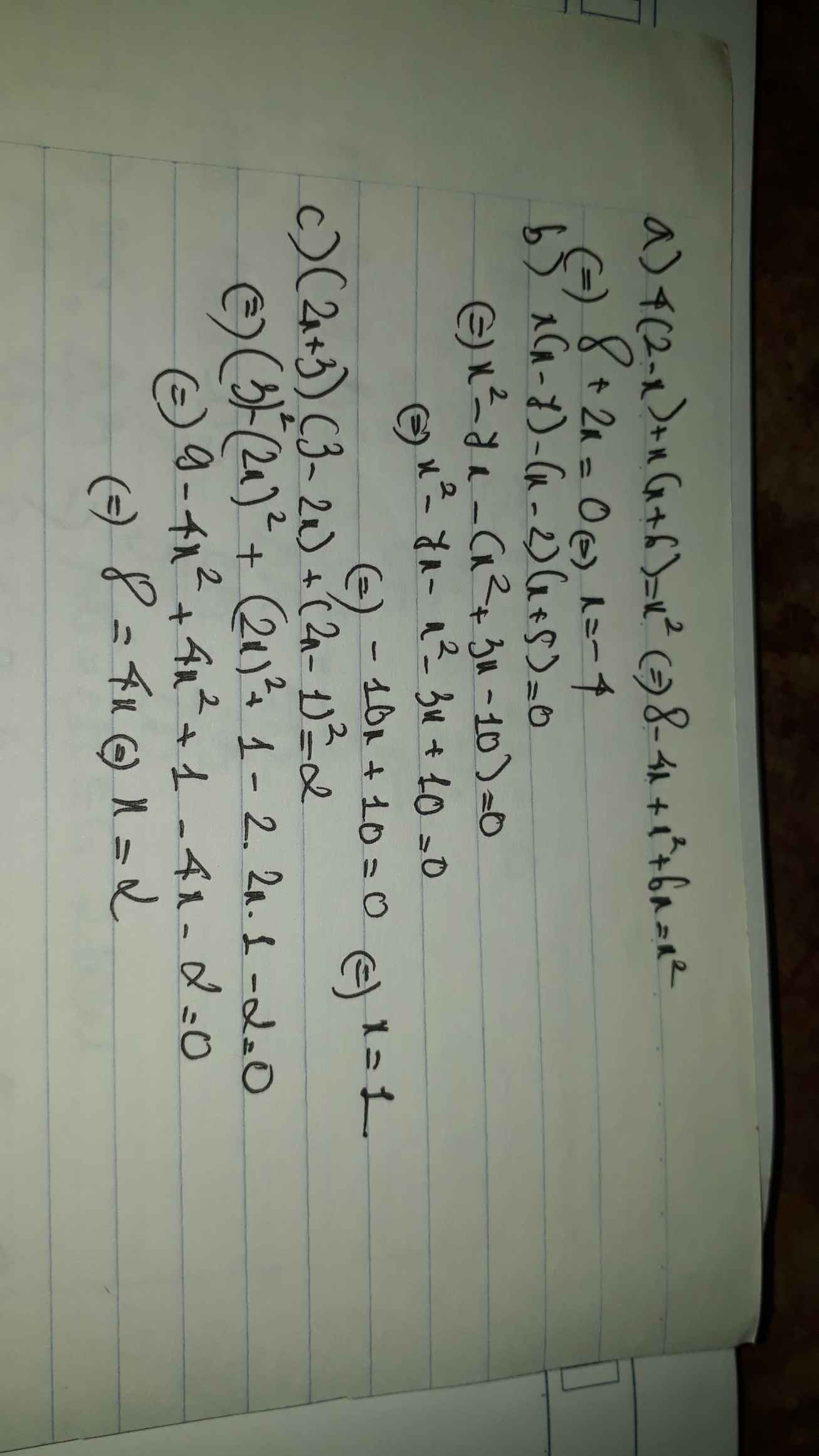Hãy nhập câu hỏi của bạn vào đây, nếu là tài khoản VIP, bạn sẽ được ưu tiên trả lời.

\(a,\Leftrightarrow\left(x-2\right)\left(5x-2\right)=0\Leftrightarrow\left[{}\begin{matrix}x=2\\x=\dfrac{2}{5}\end{matrix}\right.\\ b,\Leftrightarrow2x^2+2x-x^2+4x-4-6=0\\ \Leftrightarrow x^2+6x-10=0\\ \Leftrightarrow\left[{}\begin{matrix}x=-3+\sqrt{19}\\x=-3-\sqrt{19}\end{matrix}\right.\\ c,\Leftrightarrow2x^2-2x+9x-9=0\\ \Leftrightarrow\left(2x+9\right)\left(x-1\right)=0\Leftrightarrow\left[{}\begin{matrix}x=-\dfrac{9}{2}\\x=1\end{matrix}\right.\)

a: =>x+5>0
hay x>-5
b: =>2x+1<0
hay x<-1/2
c: =>(x-1)(x-4)>0
=>x>4 hoặc x<1

\(a,\Leftrightarrow\left(2x-3\right)\left(x+2\right)=0\Leftrightarrow\left[{}\begin{matrix}x=\dfrac{3}{2}\\x=-2\end{matrix}\right.\\ b,\Leftrightarrow x^3-27-x^3+4x=1\\ \Leftrightarrow4x=28\Leftrightarrow x=7\\ c,\Leftrightarrow4x^2-4x-8=0\\ \Leftrightarrow x^2-x-2=0\\ \Leftrightarrow\left(x-2\right)\left(x+1\right)=0\Leftrightarrow\left[{}\begin{matrix}x=2\\x=-1\end{matrix}\right.\\ d,\Leftrightarrow2x^2+6x+x+3=0\\ \Leftrightarrow\left(x+3\right)\left(2x+1\right)=0\Leftrightarrow\left[{}\begin{matrix}x=-3\\x=-\dfrac{1}{2}\end{matrix}\right.\)

a: \(\Leftrightarrow\left(x+2\right)\left(12-x\right)=0\)
\(\Leftrightarrow x\in\left\{-2;12\right\}\)
b: \(\Leftrightarrow\left(2x+5\right)\left(x-1\right)=0\)
\(\Leftrightarrow x\in\left\{-\dfrac{5}{2};1\right\}\)

a) (2x + 1)(1 - 2x) + (1 - 2x)2 = 18
= ( 1 - 2x) \(\left[\left(2x+1+1-2x\right)\right]\) = 18
= 2(1 - 2x) - 18 = 0
= 2 - 4x - 18 = 0
= -16 - 4x = 0
= -4x = 16
= x = \(\dfrac{16}{-4}=-4\)
b) 2(x + 1)2 -(x - 3)(x + 3) - (x - 4)2 = 0
= 2 (x2 + 2x + 1) - (x2 - 9) - (x2 - 8x + 16) = 0
= 2x2 + 4x + 2 - x2 + 9 - x2 + 8x - 16 = 0
= 12x - 5 = 0
= 12x = 5
= x = \(\dfrac{5}{12}\)
c) (x - 5)2 - x(x - 4) = 9
= x2 - 10x + 25 - x2 + 4x - 9 = 0
= -6x + 16 = 0
= -6x = -16
= x = \(\dfrac{-16}{-6}=\dfrac{8}{3}\)
d) (x - 5)2 + (x - 4)(1 - x)
= x2 - 10x + 25 + 5x - x2 - 4 = 0
= -5x + 21 = 0
= -5x = -21
= x = \(\dfrac{-21}{-5}=\dfrac{21}{5}\)
Chúc bạn học tốt

a) \(x^2-x+x=4\)
\(x^2=4\)
\(x=\pm2\)
b) \(3x\left(x-5\right)-2\left(x-5\right)=0\)
\(\left(x-5\right)\left(3x-2\right)=0\)
\(\left[{}\begin{matrix}x=5\\x=\dfrac{2}{3}\end{matrix}\right.\)
c) Ta có: \(a+b+c=5-3-2=0\)
\(\left[{}\begin{matrix}x=1\\x=\dfrac{c}{a}=\dfrac{-2}{5}\end{matrix}\right.\)
d) Đặt \(x^2=t\left(t\ge0\right)\) . Lúc đó phương trình trở thành :
\(t^2-11t+18=0\)
\(\left[{}\begin{matrix}t=9\left(tmđk\right)\\t=2\left(tmđk\right)\end{matrix}\right.\)
\(t=9\rightarrow x^2=9\rightarrow x=\pm3\)
\(t=2\rightarrow x^2=2\rightarrow x=\pm\sqrt{2}\)

a: Ta có: \(4\left(2-x\right)+x\left(x+6\right)=x^2\)
\(\Leftrightarrow8-4x+x^2+6x-x^2=0\)
\(\Leftrightarrow2x=-8\)
hay x=-4
b: Ta có: \(x\left(x-7\right)-\left(x-2\right)\left(x+5\right)=0\)
\(\Leftrightarrow x^2-7x-x^2-3x+10=0\)
\(\Leftrightarrow-10x=-10\)
hay x=1
c: Ta có: \(\left(2x+3\right)\left(3-2x\right)+\left(2x-1\right)^2=2\)
\(\Leftrightarrow9-4x^2+4x^2-4x+1=2\)
\(\Leftrightarrow-4x=-8\)
hay x=2

a) Ta có: \(\left(2x-1\right)\left(x^2-x+1\right)=2x^3-3x^2+2\)
\(\Leftrightarrow2x^3-2x^2+2x-x^2+x-1-2x^3+3x^2-2=0\)
\(\Leftrightarrow3x=3\)
hay x=1
Vậy: S={1}
b) Ta có: \(\left(x+1\right)\left(x^2+2x+4\right)-x^3-3x^2+16=0\)
\(\Leftrightarrow x^3+2x^2+4x+x^2+2x+4-x^3-3x^2+16=0\)
\(\Leftrightarrow6x=-20\)
hay \(x=-\dfrac{10}{3}\)
c) Ta có: \(\left(x+1\right)\cdot\left(x+2\right)\left(x+5\right)-x^3-8x^2=27\)
\(\Leftrightarrow\left(x^2+3x+2\right)\left(x+5\right)-x^3-8x^2-27=0\)
\(\Leftrightarrow x^3+5x^2+3x^2+15x+2x+10-x^3-8x^2-27=0\)
\(\Leftrightarrow17x=17\)
hay x=1


a)=> x2 + 6x + 9 - x2 + 4x = 39 => 10x = 30 => x = 3
b) => x(x - 9) + 2(x -9) = 0 => (x+2)(x-9) = 0
+)th1: x + 2 = 0 => x = -2
+)th2: x - 9 =0 => x = 9